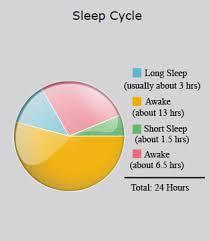What is Biphasic Sleep?
Biphasic sleep is a habit where you sleep twice in a day. For example sleeping for long hours at night and having a nap in the afternoon is biphasic sleep. Other names for biphasic sleep are divided sleep, diphasic, segmented or bimodal1.

Normally our body uses sleep patterns to determine when to sleep and wake up. This works along with your body’s need to sleep which is controlled by the following factors3:
- The normal timing of your sleep
- how long you have been awake
In our body we have circadian clock which is located in the brain. The circadian clock controls the timing of your sleep. When you are tired, this clock works with other body process to prepare you to sleep and stops other processes that can make you awake. The same occurs when you are awake.
Every person develops a sleep cycle at birth. This is influenced by several factors such as mealtime, daytime and timing of your regular activities during the day.
Our bodies adapt naturally to sleep patterns. This is made possible by a type of hormone called melatonin. This hormone is secreted when it’s dark to help you sleep and it is not produced during day time to keep you awake3.
Ways of Getting Biphasic Sleep
There are several ways a person can have biphasic sleep such as5:
- Long nap: Long nap is where you sleep around five hours at night with about one hour during the day.
- Short nap: In short nap, you sleep for six hours at night and with about twenty minutes during the day.
Health Benefits of Biphasic Sleep
There is limited research that proves that biphasic sleep is healthy. Since individuals are different, what works for one may not necessary work for another person. Some people have reported that sleeping twice a day makes them alert, boosts their cognitive function and wakefulness.1, 3
Other benefits of biphasic sleep include:
- It enhances your energy levels: Sleeping twice in a day boosts your energy levels needed to perform various activities during the day.
- It improves your productivity: With increased energy levels, you are able to complete assignments at work.
- It improves concentration: Sleeping twice a day raises your energy levels which make you alert. This alertness makes you concentrate fully on your work.
Tips of Achieving Biphasic Sleep
Although sleeping twice in a day can occur naturally to some people, you can also condition yourself to have a biphasic sleep. You can follow the following tips to achieve a biphasic sleep5:
- Put off the light: Any kind of light in the room interrupts your sleep. Switch off all the light in the room to enable you have uninterrupted sleep.
- Sleep naturally: Most of us are used to waking up with the help of an alarm. Alarm can interfere with your sleep pattern. Avoid setting an alarm so that you can sleep well.
- Oversleep: Do not regret when you oversleep. At first, this sleeping pattern is tiring but with time, you will adapt.
- Move around: When you are conscious after waking up, do not sit in bed. Get up and move around. This will help you sleep again.
- Develop a sleeping schedule: You can come up with a sleeping pattern and adhere to it. Your schedule will help you when to sleep and wake up. Start experimenting when to sleep and how long and the duration of the nap during the day. With time you will adapt this sleeping pattern.
Reference list
- Biphasic sleep https://www.medicalnewstoday.com/articles/319425.php
- Biphasic sleep https://www.healthline.com/health/biphasic-sleep#research4
- Biphasic sleep http://renaissancehumans.com/what-two-weeks-of-biphasic-sleep-did-to-me-polyphasic-sleep/
- https://www.marksdailyapple.com/how-to-conduct-a-personal-experiment-biphasic-sleeping/
- Biphasic sleep. Available at https://sleephabits.net/sleep-patterns
